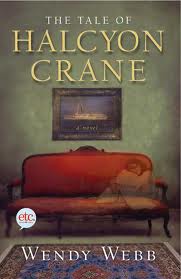 Julia is a woman who needs to get away from her life. Her husband has just committed suicide after being outed as "The Midwestern Bernie Madoff". As a corporate officer, Julia will face some of the blame and possibly prison. Suddenly, Adrian knocks at her door. He offers her the opportunity to care for his aging mother in her home, a mansion in northern Minnesota. Julia knows who Adrian's mother is because she is a famous author. Julia also knows that this famous author died years ago.
Julia is a woman who needs to get away from her life. Her husband has just committed suicide after being outed as "The Midwestern Bernie Madoff". As a corporate officer, Julia will face some of the blame and possibly prison. Suddenly, Adrian knocks at her door. He offers her the opportunity to care for his aging mother in her home, a mansion in northern Minnesota. Julia knows who Adrian's mother is because she is a famous author. Julia also knows that this famous author died years ago. And so begins The Vanishing by Wendy Webb. The story is set mostly in the mansion, known as Havenwood. To get there, Julia has to surrender her cell phone, her credit cards, and anything that would allow anyone to trace her to her old life. Figuring that this might not be so bad given her present circumstances, Julia agrees to give it a try.
Once at Havenwood, Julia immediately senses strange happenings. It seems that people in pictures on the walls can speak, and sometimes she thinks that she is hallucinating scenes from the past. She dismisses it a side effect of discontinuing her anti-depression medication, and the fact that she is in a really old, beautiful yet creepy house, caring for a woman who the world believes is dead.
This story has a lot in common with The Thirteenth Tale by Diane Setterfield, where the narrator spends time with an aging author and eventually draws out the scariest tale yet, one that happens to be true. It also is similar in many respects to Webb's earlier book, The Tale of Halcyon Crane, which was set in a haunted mansion on Mackinac Island. However, The Vanishing has enough twists and turns to distinguish it from those other stories, and to keep the reader turning the pages.
There's something about The Tale of Halcyon Crane that seems to appeal to you. Yes you. Although it was never a best seller, my review of that book has been among my top 10 posts in terms of page views for at least the last year. If you liked Halcyon or Thirteenth Tale, then grab The Vanishing and start reading. Yes, some of it is predictable. Yes, there are improbable plot twists. As Webb says in her acknowledgements, she's "not trying to define a generation, right any great wrongs, or change the way you think about the world or your place in it. [She] just want[s] to craft a good story that will delight you, entertain you, grab you and not let you go, and send some shivers up your spine along the way." That she does.
I requested and received a free electronic copy of The Vanishing and agreed to review it. Other than that, no promises were made and no payments were received.
Next Up: The Rose Labyrinth by Titania Hardie
Still Listening to: Manson: The Life and Times of Charles Manson by Jeff Guinn







